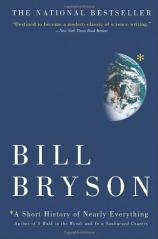A Short History of Nearly Everything
Review
A Short History of Nearly Everything
Thank goodness Bill Bryson has an insatiable thirst for knowledge.
Here I thought he just walked all over the world and then wrote
about it --- fortunately not. I've read about half a dozen of his
books: A WALK IN THE WOODS, NOTES FROM A SMALL ISLAND, NOTES FROM A
BIG COUNTRY, NEITHER HERE NOR THERE, even a dictionary he wrote.
Not one of them failed to elicit embarrassing giggles, often at
highly inconvenient, and public, times. So I jumped at the chance
to read A SHORT HISTORY OF NEARLY EVERYTHING. I mean, just look at
the title! By the time I'd finished the Prologue, I was running to
my husband exclaiming how incredible this book was going to be. I
can't vouch for the accuracy of the content, but written the way it
is, it undeniably makes learning fun. While his travelogue humor is
much more likely to elicit wild bouts of guffaws, Bryson speckles A
SHORT HISTORY OF NEARLY EVERYTHING with amusingly constructed
sentences and an occasional observation on the absurdity of what he
has singled out to share with us.
Bryson cements the facts with quirky personalities and places. Lord
Kelvin, for instance, father of the temperature scale that bears
his name, virtually leaps alive on the pages, as do Richter,
Pasteur and a host of others. Biographical trivia personalizes
these gods of science and history. Did you know that Albert
Einstein failed his college entrance tests the first try? That
little factoid should make you feel better the next time your boss
scoffs derisively at your presentation.
One of the chapters includes a fascinating look at the life and
work of Charles Darwin, distilled down to the intriguing parts and
expanded upon with charmingly obscure odd morsels. Here's a good
one: after reading Darwin's ON THE ORIGIN OF SPECIES, an editor of
the British Quarterly Review politely suggested he write on
a subject that might be of more interest to a large audience, say a
book about pigeons.
Aside from an abundance of famous names, you'll encounter some key
minds wrapped in lesser-known countenances. For example, have you
ever heard of the Reverend William Buckland? Likely not, but he
made some exciting discoveries among the fossils of yore. How about
his friend, Gideon Algernon Mantell, a country doctor and amateur
paleontologist? You can find out about this man's tragic life in
the shadows of a great discovery he made.
When Bryson isn't treating his readers to an intimate look inside
some eccentric scientists' lives, he's wowing us with some truly
staggering figures --- the number of atoms it takes to build a
pinhead; the distance, in terms we can almost grasp, of Pluto from
where you sit at your computer right now; the depth of the Earth's
crust, or simply its age. (I can tell you without giving the plot
away that it is very old.)
A SHORT HISTORY OF NEARLY EVERYTHING starts with the birth of the
universe and the creation of the Earth, and then carries through
evolution, the discovery of elements, the counting of comets, the
makeup of chromosomes and DNA, the mysteries of the seas, the
composition of the air, and potential --- and historic --- natural
disasters, to name but a few of the subjects covered.
I can't imagine what Mr. Bryson will tackle next. It seems he has
covered literally everything in just this one volume. But I look
forward to his future undertaking with unabashed eagerness.
Reviewed by Kate Ayers on January 23, 2011
A Short History of Nearly Everything
- Publication Date: September 14, 2004
- Genres: Nonfiction, Science
- Paperback: 560 pages
- Publisher: Broadway
- ISBN-10: 076790818X
- ISBN-13: 9780767908184





